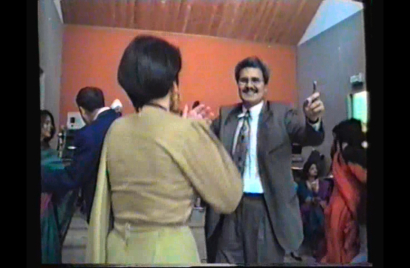
CoppaFeel brand refresh aims to reach a new generation
The charity has worked with Livity to encourage young people to check their chest

‘Leave them certain’ delivers a masterclass in behavioural change by encouraging people to talk to their loved ones about organ donation.

In the myriad of difficult questions which form the fabric of family life, there are few perhaps which feel as impossible as talking to your loved ones about organ donation.
In fact research shows that fewer than half (47%) of families agree to an organ donation going ahead if they are unaware of their loved one’s decision to be a donor.
However, when this difficult conversation is had, nine out of 10 people agree to organs being donated, if it was what their loved ones wanted. Silence kills.
But it is this stigma of silence that the NHS Blood and Transplant and Pablo successfully shatter with the gentlest of touch in a new campaign from Pablo London. Launching today across print, radio and social, the campaign encourages people to break that silence by dramatising the real life story, grief and uncertainty faced by one family member.
The film features video footage of the real life memories of Shivum Kakkad and his dad Bharat, who passed away in 2019. The real home video footage delivers an authentic and sensitive portrayal of family life. Warm memories shattered by footage of Shivum, who is played by an actor in the film, in a hospital corridor struggling to decide whether his father wanted to donate his organs or not, as they had never spoken about it.
Jacob Hellstrom, a creative on the campaign says that it quickly became obvious to the team that there was no way in which they couldn’t use a true story within the campaign. He explains: “Those genuine moments, memories, and impressions of someone’s family are just not something you can fake. There was no replicating a loving life shared like that of Shivum and his dad Bharat.”
But did choosing a real life story and using real footage give the team a greater sense of responsibility to the integrity of the story? Hellstrom agrees that sharing someone’s real story and personal memories has been a huge responsibility. He says: “We’re immensely grateful to Shivum for being so graceful and opening up about his and his father’s relationship. Throughout the process we wanted to stay as true to them both as possible from the words we say to the visuals we show. We hope we’ve done him and his family justice.”
Gareth Mercer, CEO and Founding Partner at Pablo, explained that while there is widespread awareness about the change in the law around organ donation, what there is not widespread awareness about is the fact that family and loved ones are involved in giving the final consent for organ donation. "It's imperative that this conversation is held in every family, up and down the country. We made the distress of not knowing your loved ones' decision, if the unthinkable was to happen, the creative focus of this work. We hope it ensures people talk to their nearest and dearest,” he explains.
Alex Cullen, Head of Organ Donation Marketing from NHS Blood and Transplant added: “We know that the public are overwhelmingly supportive of organ donation. This campaign is rooted in the behaviour change needed for people to know what their loved ones wanted.”
Cullen describes the footage from Shivum and his family as “a powerful motivator” showing so simply why we all need to talk about this. He continues: “Ultimately, we want more people to go online and register their organ donation decision and speak with their families.”
To ignite this change in behaviour the campaign is reframing the challenge of organ donation and hopes to ignite a new conversation within families. As Amy Fasey, a creative on the campaign explained: “This campaign is unique because we’re not actually encouraging people to say yes or no to organ donation. Instead, it’s a campaign to look out for your loved ones in a devastating moment, a moment when they may be asked to make a decision about whether or not to donate your organs, whilst still processing your loss.”
Fasey continues: “This time is extremely traumatic and difficult for so many people, so through this campaign we hope to get families talking about organ donation and secure some certainty for a moment when they will need it the most. The line itself reminds you to do just that, to give the ones you love the gift of certainty for when you are gone.”
Appreciating the people in your life more than ever, it’s the perfect moment to find time to talk with each other.
Dan Watts
The campaign comes in the midst of a global pandemic, one which is forcing families to consider their own mortality in a myriad of cruel and brutal ways on a daily basis. With news headlines and death tolls rising on a daily basis the risk is perhaps that viewers are becoming more numb to emotional storytelling and grief.
Dan Watts, Executive Creative Director at Pablo, agrees that people have become numb to emotional advertising that just plays back to them what they are feeling in the current moment. He explains: “None of us wants that right now. We want to be entertained and cheered up. However, this is not an ad about the current crisis and using humour was never going to be an option for this.”
Instead, this is an advert which encourages viewers not to just imagine the worst but plan for it and ignite a new conversation in a culture in which even at the height of a pandemic, difficult conversations remain unsaid.
Watts explains: “Organ donation can be an extremely emotional and personal thing for people and talking about it is easily put off. So, it was important the NHS explained this in a sensitive manner that made you think about your own loved ones. And currently we are at a time when we are doing exactly that. Appreciating the people in your life more than ever, it’s the perfect moment to find time to talk with each other.”
This campaign is instrumental to the wholesale behavioural change in organ donation, which has accompanied the change in the law which made organ donation opt-out. Yet, as families are still consulted, it's vital that change extends beyond the legislation to a broader cultural shift.
Joan Devereux, Strategy Director at Pablo, explains: “Discussing organ donation with our loved ones helps ensure that our wishes will be carried out and eases the burden at what is always a difficult and distressing time.”
The sensitivity of communicating this cultural shift is articulated by Florence Prevezer, Account Director at Pablo. She explains: “Whilst the intention behind the film we’ve created is to motivate people to talk to their family about organ donation, through highlighting the distress of leaving your loved ones not knowing your decision on organ donation, the creative process helped us appreciate the importance of this conversation and the fact that it doesn’t have to be as onerous as you might expect.”
She adds: “Given the profound nature of the topic, what you want to happen with your organs at the end of your life, we assumed the conversation would be a difficult one to have. In reality, it can be more manageable and easily done than first thought. At many points throughout the development of this work, we had partners or flatmates who were listening in to our Zoom meetings which prompted a conversation afterwards about their decision on organ donation. ‘FYI, I would like to be an organ donor’, was casually proclaimed whilst they were making lunch or folding the washing or making a cup of tea. Our brief was to encourage and prompt people to get talking. Once they do, hopefully the heaviness around the topic will subside and there will be real comfort in sharing.”
As Devereux explains: “Organ donation is a sensitive topic but the key message of this campaign is that we can reduce the burden on our loved ones by having the conversation and letting our families know what we would like to happen. Although over 80% of people would consent to or consider organ donation, if it's never been discussed, families find it very difficult to have to make the decision on our behalf.”
Our brief was to encourage and prompt people to get talking. Once they do, hopefully the heaviness around the topic will subside and there will be real comfort in sharing.
Florence Prevezer
In real life, although Shivum and his family were unsure of Bharat’s decision, they decided to go ahead with organ donation as they felt helping others was part of his intrinsic nature. Subsequently, Bharat donated his corneas, both his kidneys and other tissue.
To further highlight the role of the family and the emotional benefits of talking about organ donation, the campaign features additional real-life stories from other donor families who have lost loved ones, or those who have received an organ transplant.
The ‘Leave them certain’ creative concept went through rigorous testing, with focus groups made up of a broad range of demographic backgrounds. For the NHS, a key part of this campaign is about reaching different communities and encouraging everyone to have the conversation around organ donation.
When silence kills, this campaign is a compelling example of the power of creativity to change behaviours by breaking through the stigma which still surrounds confronting our own mortality.


Looks like you need to create a Creativebrief account to perform this action.
Create account Sign inLooks like you need to create a Creativebrief account to perform this action.
Create account Sign in